Have you ever wondered what marketing automation is and how it actually works? In today’s fast-paced digital world, businesses are constantly looking for ways to streamline their marketing efforts and maximize their efficiency. Marketing automation is a powerful tool that allows companies to automate repetitive tasks and streamline their marketing campaigns. In this article, we will explore what marketing automation is, how it works, and how it can benefit businesses of all sizes. So, let’s dive into the world of marketing automation and discover how it can revolutionize your marketing strategy!
Definition of Marketing Automation
Marketing automation is a technology-driven strategy that enables businesses to automate their marketing activities and streamline their processes. It involves the use of software platforms and tools to automate repetitive tasks, manage data, and optimize marketing campaigns. By leveraging marketing automation, businesses can effectively target and engage with their audience, nurture leads, and drive conversions. It allows for personalized and relevant communication with customers, helping to build strong relationships and meet business goals more efficiently.
Understanding the Concept
At its core, marketing automation revolves around the idea of delivering the right message to the right person at the right time. It goes beyond traditional marketing methods by leveraging data and technological advancements to create a seamless and personalized customer experience. By automating tasks such as email marketing, lead scoring, and campaign management, businesses can focus on high-value activities and maximize their marketing efforts.
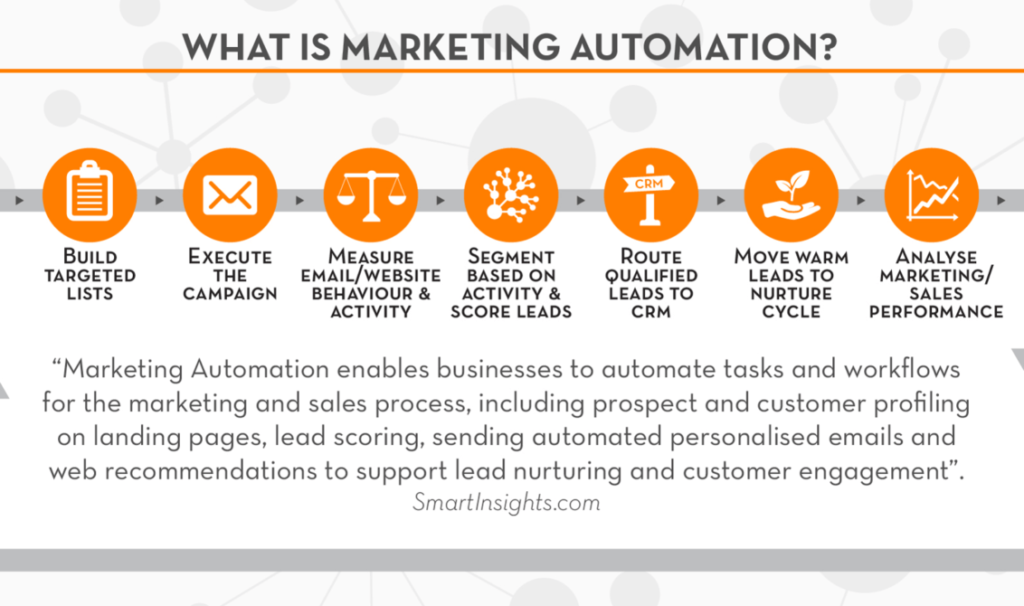
Benefits of Marketing Automation
Implementing marketing automation brings numerous benefits for businesses. Here are some of the key advantages:
Time and Resource Efficiency
Marketing automation enables businesses to automate repetitive tasks, saving time and resources. By automating processes such as email campaigns and lead nurturing, marketers can focus on strategic activities, creative content creation, and analyzing campaign performance.
Improved Lead Generation and Conversion Rates
Marketing automation helps businesses generate more qualified leads and increase conversion rates. With automated lead nurturing and scoring, leads can be nurtured with relevant and timely content, guiding them through the sales funnel and increasing the chances of conversion.
Enhanced Customer Experience
By leveraging customer data and behavior tracking, marketing automation allows for personalized and tailored communication. Customers receive relevant content and offers that match their preferences and needs, leading to a more positive and engaging experience.
Increased Revenue and ROI
Marketing automation helps businesses drive revenue growth and increase return on investment (ROI). By optimizing marketing efforts and identifying high-value leads, businesses can effectively allocate resources and achieve better campaign results.
Better Data-Driven Decision-Making
With marketing automation, businesses have access to valuable data and insights. By tracking customer behavior, monitoring campaign performance, and analyzing data, businesses can make informed decisions and continuously optimize their marketing strategies.
Key Features of Marketing Automation
To fully understand marketing automation, it is important to be familiar with the key features and functionalities it offers. Here are some of the key features of marketing automation:
Lead Nurturing and Lead Scoring
Marketing automation platforms enable businesses to nurture leads by delivering relevant content and personalized experiences. Lead scoring assigns values to leads based on their engagement and behavior, helping businesses prioritize and focus on the most promising leads.
Email Marketing Automation
With marketing automation, businesses can automate their email marketing campaigns, from personalized welcome emails to drip campaigns and automated follow-ups. Automation allows for timely and relevant communication with leads and customers, increasing engagement and driving conversions.
Behavior Tracking and Segmentation
Marketing automation platforms track customer behavior, from website visits to email opens and clicks, providing valuable insights into customer preferences and interests. This data can then be used to segment customers into targeted groups for personalized messaging and targeted campaigns.
Campaign Management
Marketing automation platforms offer comprehensive campaign management features. Businesses can design and execute multi-channel campaigns, schedule and automate content delivery, and monitor campaign performance, all within a single platform.
Social Media Management
Many marketing automation platforms include social media management capabilities. Businesses can schedule and publish social media posts, monitor engagement, and track the impact of social media activities on their overall marketing efforts.
Analytics and Reporting
Marketing automation platforms provide robust analytics and reporting capabilities. Businesses can measure and analyze campaign performance, track key metrics, and gain valuable insights into the effectiveness of their marketing strategies. This data helps inform future marketing decisions and optimizations.
CRM Integration
Integration with Customer Relationship Management (CRM) systems is a crucial feature of marketing automation. It allows for seamless data transfer between marketing and sales teams, ensuring a unified view of customer information and enabling better collaboration and alignment.
Personalization and Dynamic Content
Marketing automation platforms enable businesses to deliver personalized experiences and dynamic content. By leveraging customer data and segmentation, businesses can create highly targeted and relevant messaging that resonates with their audience, increasing engagement and conversion rates.
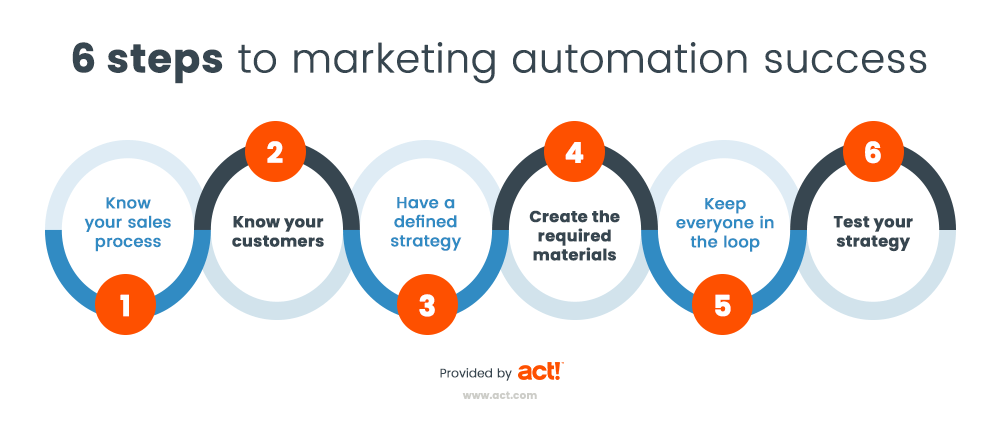
How Marketing Automation Works
To take advantage of marketing automation, businesses need to understand the underlying processes and workflows. Here is a step-by-step overview of how marketing automation works:
Capturing and Organizing Data
Marketing automation begins with capturing and organizing customer data. This includes information such as email addresses, website activity, and social media interactions. Data can be collected through various channels, including website forms, email opt-ins, and landing pages.
Building Customer Profiles
Once data is collected, marketing automation platforms help businesses build comprehensive customer profiles. These profiles include demographic information, behavior patterns, preferences, and purchase history. By consolidating data from multiple sources, businesses can gain a holistic view of their customers.
Segmentation and Targeting
Marketing automation platforms allow businesses to segment their customer base into targeted groups based on various criteria, such as demographics, behavior, or engagement levels. Segmentation enables businesses to deliver personalized messaging and relevant content to each segment, increasing the effectiveness of marketing efforts.
Designing Automated Workflows
Automated workflows are the backbone of marketing automation. These workflows define the steps and actions that occur based on specific triggers or conditions. For example, a workflow can be created to send a welcome email to new subscribers or trigger a follow-up email after a customer makes a purchase.
Creating and Scheduling Campaigns
Marketing automation platforms allow businesses to create and schedule campaigns across multiple channels, such as email, social media, and SMS. Campaigns can be designed using pre-built templates or customized according to specific requirements. Scheduling features automate the delivery of content based on predetermined dates or customer actions.
Monitoring and Optimizing Performance
After campaigns are launched, marketing automation platforms provide real-time monitoring and analytics. Businesses can track key metrics, such as open rates, click-through rates, and conversion rates, to assess campaign performance. This data helps identify areas for improvement and informs future marketing strategies and optimizations.
Benefits of Marketing Automation (Continued)
Time and Resource Efficiency (Continued)
Marketing automation allows businesses to streamline their marketing processes, saving time and resources. Instead of manually executing repetitive tasks, marketers can focus on strategic activities and creative content creation, leading to increased efficiency and productivity.
Improved Lead Generation and Conversion Rates (Continued)
Marketing automation helps businesses generate more qualified leads and improve conversion rates. By nurturing leads with targeted and personalized content, businesses can guide them through the buying journey, build trust, and increase the likelihood of conversion.
Enhanced Customer Experience (Continued)
Marketing automation enables businesses to deliver personalized experiences to their customers. By leveraging customer data and segmentation, businesses can send relevant and timely content that meets the specific needs and preferences of each individual, leading to a more engaging and satisfying customer experience.
Increased Revenue and ROI (Continued)
Marketing automation helps businesses drive revenue growth and achieve a higher return on investment. By optimizing marketing efforts and focusing on high-value leads, businesses can effectively allocate resources, reduce wasted efforts, and increase overall campaign performance, ultimately leading to increased revenue and ROI.
Better Data-Driven Decision-Making (Continued)
Marketing automation provides businesses with access to valuable data and actionable insights. By tracking customer behavior, analyzing campaign performance, and measuring key metrics, businesses can make data-driven decisions and continuously optimize their marketing strategies for better results.
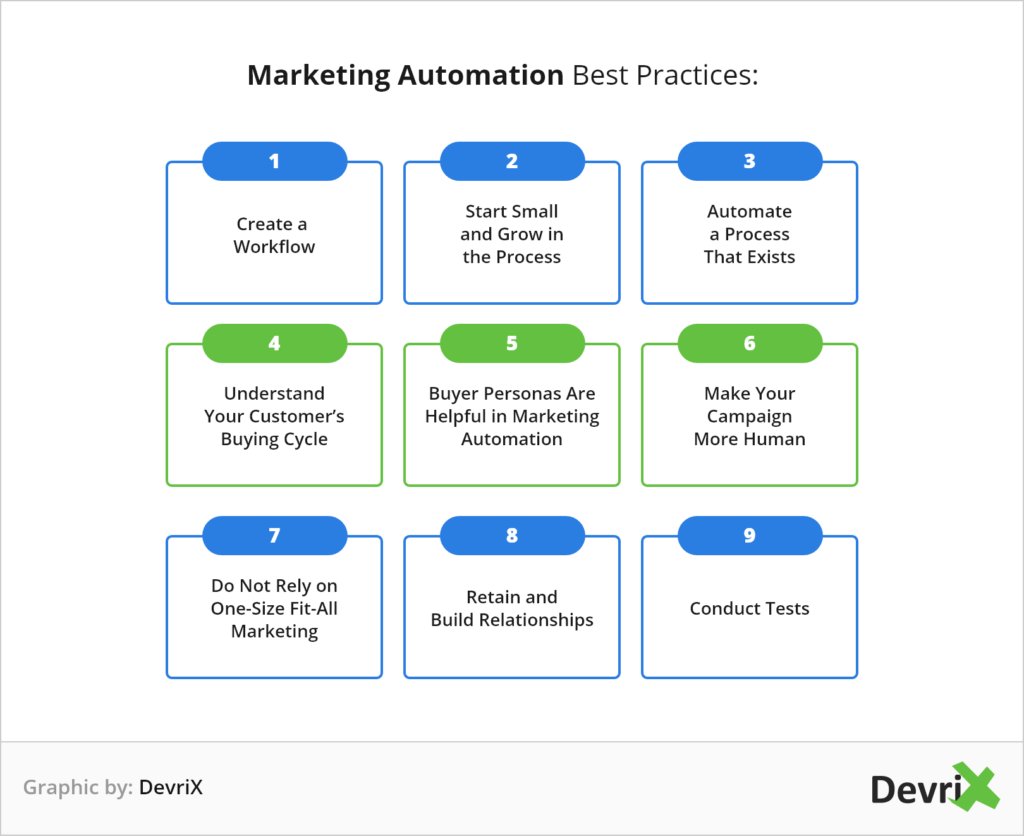
Common Use Cases of Marketing Automation
Marketing automation can be applied to various marketing scenarios and use cases. Here are some common examples:
Lead Nurturing and Drip Campaigns
Marketing automation allows businesses to nurture leads over time through automated drip campaigns. By sending a series of targeted and personalized emails, businesses can stay connected with leads, educate them about their product or service, and gradually move them through the sales funnel.
Automated Email Series
Automated email series are a popular use case for marketing automation. Businesses can create a series of emails that are automatically sent to subscribers based on specific triggers or time intervals. These series can be used for onboarding new customers, sharing product tutorials, or delivering a personalized email course.
Abandoned Cart Recovery
Marketing automation can help businesses recover lost sales by automatically sending targeted emails to customers who have abandoned their shopping carts. These emails often include personalized incentives or reminders to encourage customers to complete their purchase.
Welcome and Onboarding Campaigns
Marketing automation allows businesses to create automated welcome and onboarding campaigns for new customers or subscribers. These campaigns provide a personalized and engaging experience, helping customers familiarize themselves with the brand and its offerings.
Customer Retention and Loyalty Programs
Marketing automation can help businesses retain existing customers and build loyalty. Automated campaigns can be used to send personalized offers, anniversary rewards, or reminders for recurring purchases, creating a sense of value and appreciation for customers.
Cross-Selling and Upselling
With marketing automation, businesses can automate cross-selling and upselling efforts. By analyzing customer purchase history and behavior, businesses can identify relevant product recommendations and automatically send tailored offers to customers.
Event Promotion and Follow-Ups
Marketing automation can simplify event promotion and follow-up processes. Businesses can automate email campaigns to promote an upcoming event, send reminders to registered attendees, and follow up with personalized messages and content after the event.
Social Media Scheduling and Monitoring
Marketing automation platforms often include social media management features. Businesses can schedule and publish social media posts, monitor engagement, and track the impact of social media activities, streamlining their social media marketing efforts.
Choosing a Marketing Automation Platform
Choosing the right marketing automation platform is crucial for the success of your marketing automation efforts. Here are some factors to consider when evaluating different platforms:
Identifying Your Business Needs
Before choosing a platform, it is essential to assess your business’s specific marketing automation needs. What features are crucial for your business? What are your goals and desired outcomes? Having a clear understanding of your business requirements will help you find a platform that aligns with your needs.
Evaluating Available Features
Consider the features and functionalities offered by different marketing automation platforms. Look for features such as lead nurturing, email automation, segmentation, campaign management, CRM integration, and analytics. Assess how well these features align with your business’s goals and marketing objectives.
User-Friendliness and Ease of Implementation
Look for a marketing automation platform that is intuitive and easy to use. Consider the user interface, available documentation and training resources, and the level of technical expertise required for implementation. A user-friendly platform will ensure a smoother onboarding process and efficient use of the platform.
Integration Capabilities
Ensure that the marketing automation platform integrates seamlessly with your existing systems and tools. Integration with your CRM system is particularly important for effective lead management and sales alignment. Evaluate the platform’s integration capabilities and consider any potential limitations or customization requirements.
Pricing and Scalability
Consider the pricing structure and scalability of the marketing automation platform. Assess whether the platform offers different pricing tiers or packages that align with your budget and business size. Additionally, consider whether the platform can scale and accommodate your growing business needs in the future.
Customer Support and Training
Evaluate the customer support and training provided by the platform vendor. Look for resources such as documentation, FAQs, tutorials, and webinars that can help you learn how to use the platform effectively. Additionally, consider the availability and responsiveness of customer support channels such as email or chat.
Reviews and Reputation
Research and read reviews of different marketing automation platforms. Pay attention to user experiences, ratings, and testimonials to gauge the platform’s reputation and customer satisfaction. Consider reaching out to other businesses in your industry to gather insights and recommendations.
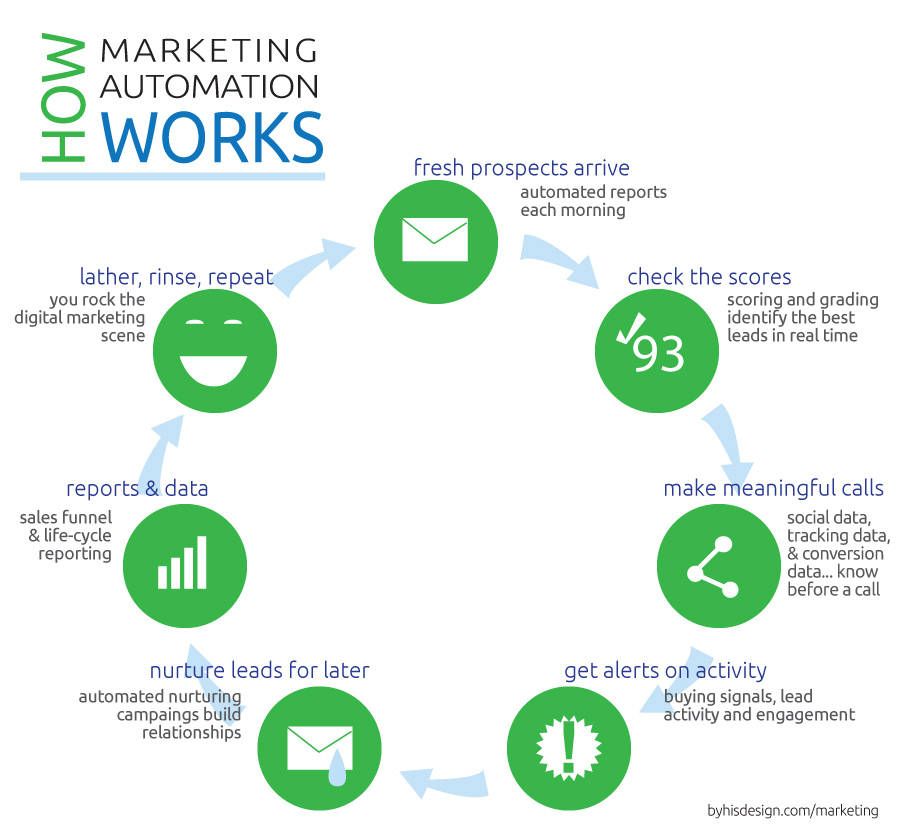
Success Factors for Implementing Marketing Automation
To ensure a successful implementation of marketing automation, consider the following factors:
Defined Goals and Strategies
Have clear goals and strategies in place before implementing marketing automation. Clearly define what you want to achieve with your marketing efforts and how marketing automation can support those goals. Having a well-defined strategy will guide your implementation and optimization efforts.
Clean and Structured Data
Invest time and effort in cleansing and organizing your data. Poor data quality can negatively impact your marketing automation efforts. Ensure that your data is accurate, up-to-date, and properly organized. This will enable the system to generate meaningful insights and personalized experiences for your customers.
Effective Content Creation
High-quality content is crucial for successful marketing automation. Ensure that you have a content strategy in place that aligns with your audience’s needs and preferences. Develop relevant and engaging content that delivers value to your customers at each stage of their journey.
Well-Designed User Journeys
Map out your customer journey and design well-defined user journeys within your marketing automation platform. Determine the touchpoints and interactions that lead to conversions and optimize your workflows accordingly. Well-designed user journeys ensure a seamless and engaging customer experience.
Continuous Testing and Optimization
Marketing automation is an iterative process. Continuously test and optimize your campaigns and workflows to improve results. A/B testing, analyzing campaign metrics, and gathering feedback from customers are essential steps to identify areas of improvement and refine your marketing strategies.
Regular Monitoring and Analysis
Monitor your marketing automation campaigns regularly. Track key metrics, analyze performance data, and generate insights that inform decision-making. Regular monitoring allows you to identify trends, spot potential issues, and make data-driven adjustments to achieve better results.
Sales and Marketing Alignment
Align your sales and marketing teams to ensure a seamless flow of communication and shared goals. Collaborate closely to define lead nurturing processes, agree on lead scoring criteria, and establish a feedback loop for continuous improvement. This alignment enhances the efficiency and effectiveness of your marketing automation efforts.
Ongoing Training and Skill Development
Invest in training and skill development for your marketing and sales teams. Ensure that they are equipped with the necessary knowledge and skills to effectively use the marketing automation platform. Ongoing training and skill development ensure that your teams maximize the potential of marketing automation and stay up-to-date with industry best practices.
Challenges and Risks of Marketing Automation
While marketing automation offers numerous benefits, it is important to be aware of the potential challenges and risks involved. Here are some common challenges to consider:
Data Privacy and Security
Collecting and managing customer data comes with its own set of challenges, particularly concerning privacy and security. It is crucial to comply with privacy regulations and implement security measures to protect customer data from unauthorized access or breaches.
Potential for Impersonal Communication
Marketing automation runs the risk of creating impersonal and robotic communication if not implemented correctly. Businesses should ensure that automated messages and content still maintain a human touch and resonate with customers on a personal level.
Over-Automation and Spamming
Automating too many marketing processes can lead to over-automation and excessive messaging, overwhelming customers and potentially leading to unsubscribes or negative brand perception. It is important to strike a balance and ensure that communication stays relevant and meaningful.
Initial Time and Resource Investment
Implementing a marketing automation platform requires time and resources to set up and customize according to your business needs. It is important to budget enough time and allocate the necessary resources for a smooth implementation and onboarding process.
Integration and Technical Issues
Integrating marketing automation with existing systems and tools can present technical challenges. Compatibility issues or limitations with third-party integrations can arise, requiring technical expertise to troubleshoot and resolve.
Skills and Knowledge Gaps
Leveraging the full potential of marketing automation requires a certain level of technical and marketing expertise. Businesses may need to upskill or hire individuals with the necessary knowledge to effectively implement, manage, and optimize marketing automation efforts.
Resistance to Change
Introducing marketing automation can face resistance from employees who may be hesitant to embrace new technology or change their established processes. Communicating the benefits and providing training opportunities can help overcome resistance and foster adoption.
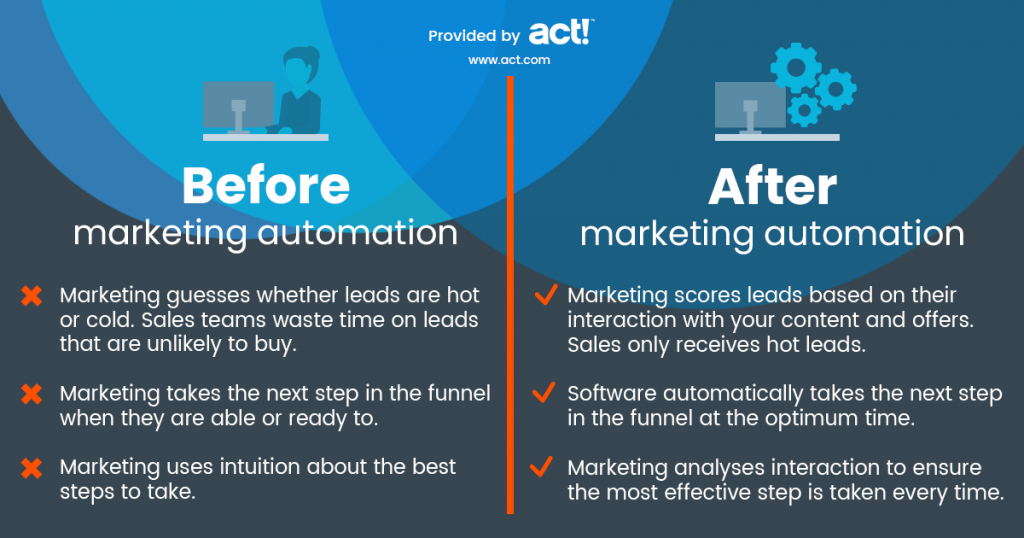
Future Trends in Marketing Automation
Marketing automation is a rapidly evolving field, and several trends are shaping its future. Here are some emerging trends to keep an eye on:
Artificial Intelligence and Machine Learning
Artificial intelligence (AI) and machine learning (ML) are increasingly being integrated into marketing automation platforms. AI-powered chatbots, predictive analytics, and personalized recommendation engines are just a few examples of how AI is enhancing marketing automation capabilities.
Chatbots and Conversational Marketing
Chatbots are becoming essential tools for customer engagement and support. By combining AI and automation, chatbots can interact with customers in a conversational manner, answer inquiries, provide recommendations, and guide them through the customer journey.
Hyper-Personalization
Hyper-personalization takes personalization to the next level by delivering highly tailored and individualized experiences. Advanced segmentation, real-time data analysis, and dynamic content generation enable businesses to create personalized experiences that resonate deeply with customers.
Voice Search Optimization
The rise of voice assistants and smart speakers is changing the way people search for information. Marketing automation will increasingly incorporate voice search optimization strategies to ensure that businesses are visible and relevant in voice search results.
Marketing Automation for Small Businesses
As marketing automation becomes more accessible and affordable, small businesses are increasingly adopting these technologies. Automation platforms tailored to the specific needs and budgets of small businesses are emerging, leveling the playing field and enabling them to compete with larger counterparts.
Integration with Emerging Technologies
Marketing automation is also being integrated with other emerging technologies, such as augmented reality (AR) and virtual reality (VR). These technologies provide new opportunities for immersive and interactive marketing experiences that can be automated and personalized.
Conclusion
Marketing automation has become an indispensable tool for businesses looking to streamline their marketing efforts, engage with their audience, and drive conversions. By automating tasks, nurturing leads, personalizing communication, and leveraging data-driven insights, businesses can optimize their marketing strategies and achieve better results.
Understanding the concept of marketing automation, its key features, and how it works is crucial for businesses aiming to implement it successfully. By choosing the right marketing automation platform, defining goals, and implementing best practices, businesses can harness the power of automation to enhance their marketing efforts, improve customer experiences, and drive revenue growth.
While challenges and risks exist, staying informed about emerging trends and continuously adapting marketing automation strategies can ensure businesses stay ahead of the curve and maximize the potential of this powerful marketing tool.











